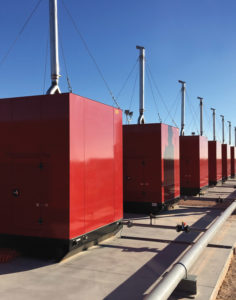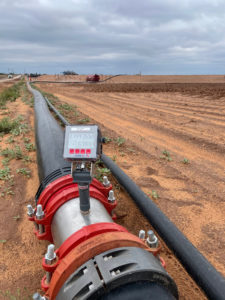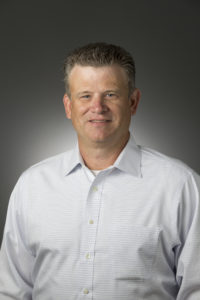Any kid growing up in northern Louisiana around Shreveport is immersed in the oil and gas business like a fish in the water. Such was the upbringing of Gravity Oilfield Services President and CEO Rob Rice. “Up in those areas, that’s just kind of what everybody did,” Rice recalled, so it’s not surprising that he has spent much of his working life in that industry.
It was a trip to a rig, initiated by a family friend employed by an international oilfield service company, that really started Rice’s wheels turning. “I was fascinated by the whole process of drilling an oil and gas well. I was always fascinated by how midstream operated and the challenges—it seemed like you always had to reinvent yourself, you had to figure out how to be more efficient, to generate more profitability. It was and still is, for me, a very exciting industry to be a part of.”
Foundational advice for his career came early when, as a teenager, he learned the value of a good presentation. Rice had arrived at one of his jobs, working for a small-business owner, in holey jeans and a t-shirt. This attire earned a lecture from the boss.
“He sat me down and said, ‘Look, your appearance matters to my business. So from now on, don’t show up like this.’” His boss gave the young Rice some logo-imprinted shirts with orders to wear them in order to properly represent the company.
On his way to an oil and gas career, there was “a slight detour,” including college and the U.S. Air Force. Looking for work upon leaving the service, Rice had several industries on his radar. But “When I got an offer to go to Houston and go to work for a pipeline company, I just thought, this is my opportunity to get back into the business.” It was also within shouting distance of his Louisiana home turf.
Rice joined Gravity in his current position in October 2018. He was Chief Operating Officer at his previous company, which he enjoyed, but it appeared that firm’s CEO was in it for the long haul, meaning the likelihood of being promoted to CEO there very low. Aspiring to that position himself, Rice was excited to find the opportunity at Gravity.
At Gravity, “I really liked the business, I liked the location—75 percent of our business is in the Permian Basin.” The Permian was important because of its downturn resistance compared to other basins.
He also liked that Gravity was diversified enough to be resilient itself. He also saw growth areas. “I thought we could better streamline [it] to be focused on more production-type activities.” With production services less prone to downturns than drilling and completions, he wanted to stabilize the company’s earnings.
The vision to improve and grow instead of simply mark time was instilled in Rice by an early mentor, the board chairman of the company where Rice made his first foray into senior leadership. “Probably the best advice he gave me was [that] the expectation of the shareholders, your employees and your customers is not that you just do the same thing. The expectations are: for your shareholders, that you figure out how to return more money to them; for your employees, that you provide a stable business for them and their families; for their customers, that you have a good product or service, whatever it might be.
“Your job, as senior leader, is to balance all of those and produce something that makes sense for all of those people.”
The 2020 pandemic made balancing any of those needs a challenge. The company workforce dropped from 1,100 to 650 as business evaporated for Gravity and everyone else in the industry. But, he noted, without those layoffs the entire company would have been jeopardized. Yet the decision was very difficult.
“As tough as that is, what I tell our managers is, it’s what you have to do. It’s unfortunate. I long for the day we can get back to 1,100 employees. But for the 650 that are here, it’s our responsibility to take these steps in order to continue to be a company going forward—and certainly for the shareholders. It’s what leadership teams have to do.”
Another challenge with cyclical downsizing is its impact on the workforce of the present and the future, Rice observed. “It’s hard to attract as many new people into the business because they see that. And if you’re part of that [one who’s been laid off], it can be life-changing or career-changing.”
He continued, “I think that’s something, as an industry, that we have to get better at,” referring to cycles of overinvestment followed by a collapse when the market is flooded and prices crash.
Hopefully,” he said, rapping his knuckles on the table, “knock on wood, we’ve learned our lesson on this one, as we all say, and we’ll be more disciplined in our approach to investing and manage our returns for shareholders more appropriately.”
Gravity has moved forward in two main areas under Rice’s watch. They’ve grown the water business through acquisition, and strengthened an already established power generation division.
The power business was mature—it just needed to be more efficient and better marketed, Rice said. “We just needed to continue to manage that business to improve it.”
Upon Rice’s October 2018 arrival the water side was small, but with the growing emphasis on produced water in the marketplace, he recognized a growth opportunity.
“It was really about adding scale,” he recalled. “We needed scale in order to achieve and become the player that we wanted to be and are now.” Six months into Rice’s tenure the company went into acquisition mode, adding three companies in rapid succession.
 But they weren’t grabbing the first three water companies on the radar. “It was about finding the right acquisition. There was a lot going on in the business in late 2018 and ’19 on the water side of the business.” They considered a number of options before whipping out any checkbooks.
But they weren’t grabbing the first three water companies on the radar. “It was about finding the right acquisition. There was a lot going on in the business in late 2018 and ’19 on the water side of the business.” They considered a number of options before whipping out any checkbooks.
One of their acquisitions was particularly of interest because that company had deep disposal wells. “The economics of those, we believe, are superior today and going forward. They were fairly new facilities and they were geographically located in an area with our existing assets so we could interconnect those assets and improve our overall utilization of the system we had as well as the system we acquired,” he explained.
The result is that Gravity is now the largest commercial SWD operator in the Midland Basin. Its larger size gave Gravity access to larger producers that would previously have created and managed their own systems.
The volatility of 2020 and beyond has made predicting the future even more risky than before, but companies must do something to plan the future. “With all the noise going on, what I tell our team is that we have to stay focused on building the best power infrastructure, water infrastructure, production chemical business as we can. With that we’ve got to figure out how to provide a higher level of service with a lower cost.”
It’s all about making the best work of what is under the company’s control. He added that Washington’s policy changes, negative publicity about oil and gas, a condition he calls “noise,” will not kill the business. “There’s enough horizon in the oil and gas business to take us through our careers, I believe. So for us, it’s really about being more efficient, more cost-competitive, and continueing to improve the position we’re in,” specifically that oil and gas provide the standard of living enjoyed by much of the world today.
For anyone evaluating their career in the industry, Rice recommends finding a job and a company that values teamwork, offers a product you like and provides an enjoyable experience. “Find something that challenges you to learn, to develop,” he said. These things sometimes require patience, but in the end, finding an enjoyable experience is worth the wait.
_____________________________________________________________________________________________
Paul Wiseman is a freelance writer in the oil and gas sector. His email is fittoprint414@gmail.com










